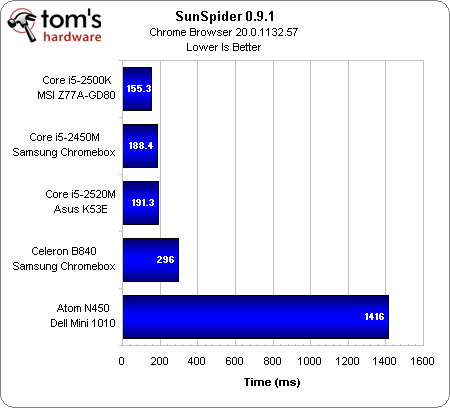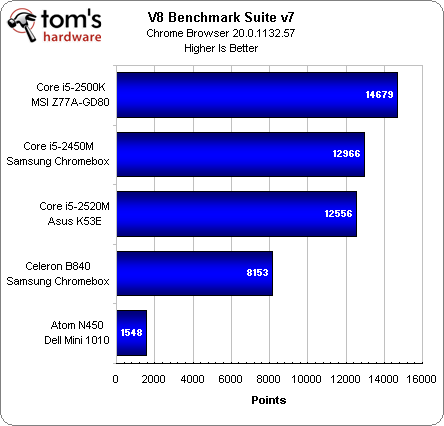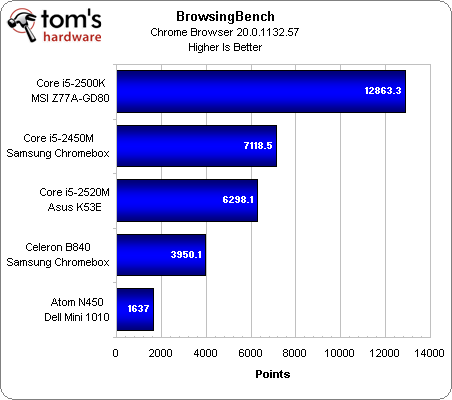Fast, Small, And Complete? Samsung's $329 Chromebox
Benchmark Results: Browser Tests
Benchmarking the Chromebox is a challenge because of its closed software ecosystem. Really, browser-based tests are our only option. Even these are imperfect, though. Although we can use the same browser on each platform, Chrome OS and Windows 7 are also variables in play. Nevertheless, our benchmarks should help illustrate each system's real-world performance.
SunSpider is a browser-based JavaScript performance test that measures screen drawing, text manipulation, and encryption. Based on our results, the Celeron B840-based Chromebox is about 50% slower than the Core i5-2450M version. But compared to the Dell Mini 1010 netbook in our lab, all of our desktop configurations are quite fast.
The V8 Benchmark Suite was created by Google specifically to test the performance of its Chrome browser.
Even though it's another JavaScript-based test, we see a much greater variation in the scores. This time, the Celeron-based Chromebox only falls about 40% behind the Core i5-2450M. Meanwhile, the Core i5-2500K hustles to the top. The most glaring finish comes from the Atom in Dell's Mini 1010, though. Compared to most nettops, the Chromebox looks mighty tempting, even with its Celeron.
BrowsingBench was created by EEMBC, also known as the Embedded Microprocessor Benchmark Consortium. It's a non-profit organization tasked with finding ways to develop testing methodology, specifically for embedded hardware. We're been playing around with this tool in the lab, and we love it. While it's meant for testing "smartphones, netbooks, portable gaming devices, navigation devices, and IP set-top boxes," it's just as applicable for testing browser performance in general.
Unlike SunSpider or V8, BrowsingBench evaluates the total performance of a browser: page loading, processing, rendering, compositing, and so on. This helps reflect real-world use, unlike a JavaScript-based metric. Frankly, these results make more sense. The Atom N450 only falls ~60% behind the Celeron-based Chromebox, which is in sharp contrast to SunSpider and V8. In the real world, a B840-based Chromebox is faster than almost any nettop, but it probably won't load and render Web pages five or 10 times faster. Meanwhile, between the two Chromeboxes, the Core i5-2450M holds a roughly 45% lead.
Get Tom's Hardware's best news and in-depth reviews, straight to your inbox.
Current page: Benchmark Results: Browser Tests
Prev Page Web-Based Gaming On The Chromebox? Next Page Chromebox: A Complete Platform For $329-
ikyung Seems like these boxes will fill the niche computer users who wants small form factors to carry around, etc. But, seems like they can add in USB/HDMI connectors into smartphones and turn it into a full fledge computers one day in the future.Reply -
boletus How can this possibly compete with a $400 laptop, which includes a screen, keyboard, at least a 320 GB hardrive, Windows, and sound? Yeah you have to get a word processor program etc, but there are free options for that. And you can use it on the bus, and hook up external displays, and read/burn DVD's,.... I've seen AMD A8 series laptops for $450, and they can even play real games. How is this worth its price? Am I missing something?Reply -
"sudo (a program enabling the installation of any generic Linux application)" please do some basic research before writing such nonsense.Reply
For example the first line on Wikipedia states:
sudo is a program for Unix-like computer operating systems that allows users to run programs with the security privileges of another user (normally the superuser, or root). Its name is a concatenation of the su command (which grants the user a shell of another user, normally the superuser) and "do", or take action. -
rootheday The article says:Reply
"But the Celeron can't accelerate video decoding, nor does it include Quick Sync support. "
This is a common misunderstanding - the Celeron and Pentium Sandybridge parts disable Quick Sync and some video post processing features (branded as ClearVideo HD) but the hardware accelerated decode is there across the board (Celeron/Pentium/Core) -
palladin9479 ReplyOn the other hand, many of us still prefer the perceived security and privacy of information stored in our own systems and backed up to drives where only we have access to them.
I take offense at this. "Cloud" storage of data is by definition less secure then local storage. Security is done in multiple layers, physical security is one of those layers, arguable the most important. Giving your data to someone else to store is dangerous unless your ~really~ know that person, giving your data to an unknown person via a third party profit orientated entity is extremely dangerous without a legal team in place to secure your best interests.
It's not just "perceived", it's real and tangible. Now we're talking about an online media player / browsing device, very small change of you storing anything personal on it. Anything you do store in "the cloud" will be analyzed by someone "not you". Just hope it doesn't try to store browsing history or media history on "the cloud". -
Onus ^Exactly. I can't take this device seriously. We need to ignore third parties with their own interests in mind urging use to "use the Cloud!" no matter how easy it seems.Reply
That "perceived security" comment was pretty darned offensive...
-
johnners2981 jtt283^Exactly. I can't take this device seriously. We need to ignore third parties with their own interests in mind urging use to "use the Cloud!" no matter how easy it seems.That "perceived security" comment was pretty darned offensive...Reply
Here, have a tissue... -
Belardo Its a cute little box, but even I don't understand its pricing. For a client, this is what I picked up at a local store for $350 (on sale):Reply
Lenovo G-Series (bottom end) i3-2x00 notebook with 4GB RAM / Windows 7 64bit / 320GB HD / 15" screen. Very little junkware.
At Costco: $430
HP Desktop with AMD A6 (bottom end quad core) with 4GB RAM / Win7 64bit / 500GB HD / 23" LCD display, crappy mouse and keyboard. The desktop is of course slower on CPU but faster on GPU.
Its great that we have ChromOS hardware coming out... but it should be $25~50 cheaper than a Windows 7 on software alone.
With Windows8 coming out soon, this is a good time to have alternatives available. Would like to see a bigger push with Linux somehow. -
lamorpa palladin9479..."Cloud" storage of data is by definition less secure then local storage.Then local storage what? If "Cloud" storage of data is by definition less secure, then local storage can be used? (then/than - different words, different meanings, different uses)Reply
-
JeanLuc I'm trying to workout why Google went with an Intel hardware setup when an ARM based SOC would have more then surficied for the purposes for which this sort of device caters for. Less power, less heat and most likely a whole lot cheaper.Reply


